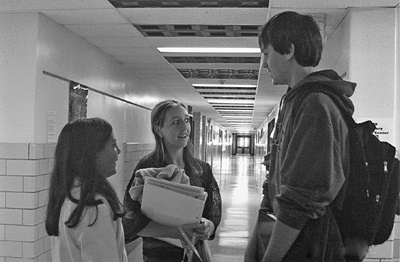All Nonfiction
- Bullying
- Books
- Academic
- Author Interviews
- Celebrity interviews
- College Articles
- College Essays
- Educator of the Year
- Heroes
- Interviews
- Memoir
- Personal Experience
- Sports
- Travel & Culture
All Opinions
- Bullying
- Current Events / Politics
- Discrimination
- Drugs / Alcohol / Smoking
- Entertainment / Celebrities
- Environment
- Love / Relationships
- Movies / Music / TV
- Pop Culture / Trends
- School / College
- Social Issues / Civics
- Spirituality / Religion
- Sports / Hobbies
All Hot Topics
- Bullying
- Community Service
- Environment
- Health
- Letters to the Editor
- Pride & Prejudice
- What Matters
- Back
Summer Guide
- Program Links
- Program Reviews
- Back
College Guide
- College Links
- College Reviews
- College Essays
- College Articles
- Back
You Don't Hear It, But I Do MAG
We dipped pepperoni pizza in ranch dressing. We guzzled juice boxes and spoke without thinking. We laughed relentlessly and believed every word we heard. We were innocent. We were boundless. We were kids. An elementary lunchroom is a magical setting – a place of friendship, laughter, and young love. But when I was eight, the cafeteria environment presented me with a question I didn’t know how to answer.
“Hey, Hope!” a blond boy called as he practically seized with laughter. I was not one to swoon at sudden attention; with three older brothers, I had heard enough commentary from the male population. But my girl friends fell victim to the charming smile, and I could sense excessive eyelash-batting and cutesy grins around me.
“Isn’t your brother one of those retarded kids?”
Confusion. Then shock. Confusion because I didn’t have a retarded brother. I had a brother named Dustin who was kind and witty and had called me a brat as long as I could remember. I knew my mom went to meetings to get him out of special classes; I knew he hated the words “special” and “Down syndrome.” I knew he loved Harry Potter and hated chicken, loathed reading books and loved me. Now, what in the world was retarded?
That word was not on any vocabulary quiz, yet it has followed me throughout my school career. I was told not to use it, yet every day the word replays in my brain. I don’t speak it, I don’t usually write it, but for the amount of space this word takes up in my skull it might as well be branded on my forehead. Scientifically, it means developmentally delayed. Elementarily, it meant that Blond Boy had no better joke.
Unfortunately, it is often the cruelest words that our memory stores for safe-keeping, to replay when we’re finally feeling happy. I have never been able to escape my head, and I certainly have never escaped this malicious word.
These three syllables were spoken more often as I got older. When I entered high school and fewer people knew me personally, it became less of a taboo for those in my vicinity. New friends didn’t know my brother; old friends forgot that the “insult patrol” was lurking. And I forgave them (and forgot them) because we all slip up sometimes.
However, I advise you to think about words before using them. You just never know who is listening. People without knowledge of my brother often toss around “retarded” casually, or as a joke. I don’t look like I have a disability, so why would I take offense? But the word affects me and has, over time, hurt me. It’s the same as how we are advised not to jokingly say “I want to kill myself,” because you never know the mental state of those you’re speaking to. Those five thoughtless words could set them on edge in the same way three tasteless syllables make me temporarily despise certain friends, teachers, and acquaintances.
Don’t tell me to “take it easy” like so many teenagers have. I will not passively accept a word that insults millions of people. The word wounds anyone with any relation to the disabled – or anyone with a heart. So take “the word,” delete it from your vocabulary, and replace it the way I should have:
“Oh, yes!” I forever wish I had replied to Blond Boy. “He is. But it’s pronounced ‘ah-maz-ing.’”

Similar Articles
JOIN THE DISCUSSION
This article has 1 comment.

My amazingly sassy older brother, Dustin, inspired me to not only write this piece but to stand up to anyone who disses the disabled. He taught me that everyone has value, and that everyone can and should be loved.